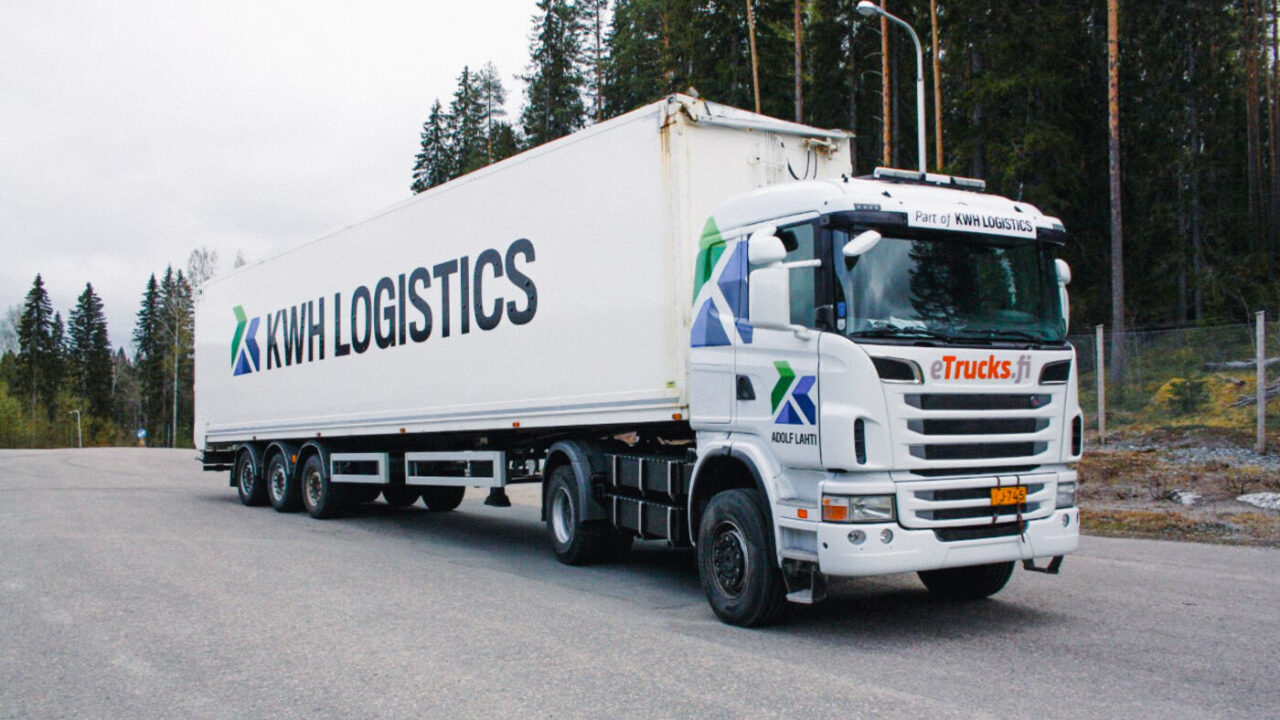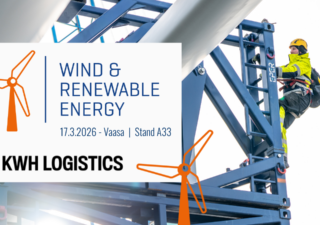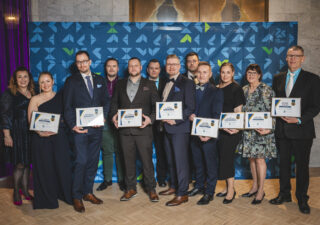KWH Logistics drives sustainable change with electrification
Thanks to cost savings enabled by new technical solutions and tightening emission requirements, companies are increasingly investing in environmentally friendly solutions in their operations. KWH Logistics is advancing environmental responsibility and sustainability by reducing heavy vehicle CO₂ emissions and promoting electric vehicle use through national and international projects.
KWH Logistics has taken a bold step towards environmental responsibility and sustainable development through various national and international projects aimed at reducing heavy vehicle carbon dioxide emissions and advancing the use of electric vehicles across all operations. These goals are being realized in practice through the acquisition of new electric vehicles and the conversion of existing diesel-powered machinery into electric-powered alternatives. In addition to improving energy efficiency, transforming the entire ecosystem of logistics chains offers opportunities to achieve significant advancements in sustainable development.
Electrification of heavy vehicles at the core of resource efficiency
The electrification of heavy vehicles addresses the EU’s stringent emission requirements. Converting existing diesel vehicles into electric-powered ones not only reduces environmental impact but also supports resource efficiency. In the conversion process, the diesel engines and powertrains of vehicles are replaced with electric components, while the rest of the chassis and technology are utilized as extensively as possible. The removed diesel components can be repurposed as spare parts for other diesel-powered vehicles, extending their lifecycle and reducing waste generation.
Conversion – a cost-effective and sustainable solution
Heavy electric vehicles remain more expensive compared to diesel alternatives, but converting a used diesel vehicle into an electric one offers a significantly more cost-efficient and sustainable option. Our collaboration with Keulink Oy and Lielahden Autokeskus Oy enabled the deployment of the first electric truck in tasks where electric operation is a viable solution.
In port and factory areas, many driving tasks involve cyclical, short-distance operations where diesel engines experience substantial idling. An electric vehicle is far more energy-efficient due to its superior efficiency, and idling does not consume energy. Additionally, in many of these operations, overnight hours are available for battery recharging.
Heavy electric vehicles remain more expensive compared to diesel alternatives, but converting a used diesel vehicle into an electric one offers a significantly more cost-efficient and sustainable option.
Deployment and training
At KWH Logistics, it is understood that the successful use of electric vehicles requires a functional charging infrastructure, maintenance system, and skilled personnel. Staff training in electric vehicle maintenance and safety is ongoing, ensuring that the fleet remains in good condition and the team masters new technologies. The safety and conditions of the work environment improve significantly, as electric vehicles reduce noise and vibration.
Future competitive advantage
KWH Logistics sees responsibility as a competitive advantage and considers it important to stay at the forefront of technological development. As the market evolves and emission standards tighten, being at the forefront gives our company a competitive edge and enables the practical implementation of responsible values. With electric vehicles, we are able to offer innovative solutions to our customers while also achieving our own emission reduction goals.
The future demands sustainability and flexibility from companies. On this path, our company is taking steps toward a more sustainable tomorrow—by building tangible, low-emission, and resource-efficient solutions in collaboration with expert partners.
Sustainable development key projects
KWH Logistics is involved in several significant projects that support, among other things, the electrification of heavy vehicles and the reduction of environmental impacts:
- Conversion of Heavy Vehicles to Electric Power: The process of converting diesel-powered machinery to electric is underway in collaboration with Lielahden Autokeskus and Keulink. The first converted heavy truck has been in operation for two years at the Metsä-Fibre factory area in Äänekoski. Using the results from this pilot project, conversions of additional heavy-duty trucks have begun. These projects provide valuable data and user experiences to guide development in the right direction, reducing emissions and promoting circular economy principles.
- Conversion R&D Center in Keuruu: Keulink has established a research and development center that conducts research and supports conversion projects both technically and innovatively. KWH Logistics is involved in the project by contributing practical requirements for the use of transportation vehicles and machinery, as well as providing real-world test environments. We also participate in the steering group and provide financial support for the project.
- EU ESCALATE Project: We are involved in the EU-funded ESCALATE project, where we are collaborating with VTT, Sisu, Kempower, and Valmet Automotive to develop an electric, modular truck. The goal of the development work is to create a truck capable of a 500 km range on a single charge and a single range-extender hydrogen fuel cell refill. Additionally, the aim is to achieve a 750 km driving range using intermediate charging and hydrogen refueling.
- Business Finland, BESPORT Project: The project involves VTT, Kalmar, Ioxio, Visy, Oulun Satama, Awake, and KWH Logistics. The project aims to develop energy efficiency in the logistics chain and tools for data management to benefit the ecosystem by utilizing data collection and analysis, as well as new energy sources. The project includes practical pilot implementations.
- North Ostrobothnia Regional Council (JTF funding), Port Automation: The project involves the University of Oulu, Oulu Port, Raahe Port, Sumirai Tech., Neste, Kalmar, and KWH Logistics. The goal of the project is to develop and equip an experimental research, development, and training environment at an international level, focusing on the automation of heavy hybrid and electric-powered port machinery designed for container handling. The project also aims to significantly raise the regional level of expertise to international excellence and initiate extensive international collaboration. A further goal is to enhance the automation capabilities of local port, mining, and forestry industry operators.
- Leader Pirityiset, Kase ESSI – Feasibility Study on Energy Storage Systems: The feasibility study involves the Kaustinen Region, KWH Logistics, and Keulink Oy. The Kase ESSI project, focusing on the possibilities of energy storage, aims to provide insights into the future opportunities of electric logistics, guide rural areas in developing energy storage solutions for electricity and district heating networks, create networks among energy storage system operators, explore investment prospects, and compile information on energy storage. The project promotes the use of electric machinery in work sites that are not near the electrical grid.
- Traficom Six Hove Project: The goal of this project is to create a roadmap for the electrification of heavy traffic in Finland, in collaboration with research institutions and industry partners. The project involves testing and developing vehicles and charging infrastructure, specifically tailored to business needs.
KWH Logistics is also a member of several working groups aimed at promoting sustainable development and ensuring environmental well-being for the future, including Meriverkko (Ministry of the Environment), the Ace Life Project (SYKE), Ekosysteemikoulu (City of Kokkola), and Race for Baltic (John Nurminen Foundation).












